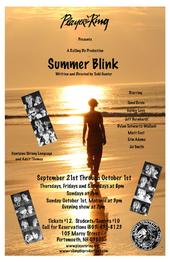SYNOPSIS:
Mina is 18. She is graduating from high school and is facing the summer that is the prologue to her new life. A life of no college plans, no job, no money, and no idea of what she's going to do once September comes and all of her friends are gone to college. But she does have the summer, and an opportunity to still surprise herself by what life can bring when you least expect it.
The main characters in her life supply her with plenty of detours. Jake, her longtime friend and boyfriend whom she promptly breaks up with after graduation just to prove that she can. Evan, her younger brother who has a wit that belies his age, and Alison, the new face from NYU, staying for the summer and who breathes fresh life into everyone, sometimes for the better and sometimes for the worse.
Summer Blink chronicles a summer full of orange-hued memories and sweeping sensory overload. A time when you did everything society and your parents warned you not to just to prove you were alive.
PORTLAND PHOENIX REVIEW OF ORIGINAL STAGE PRODUCTION
-YOUTHFUL BLISS
By: MEGAN GRUMBLING
“I’m not trying to kill myself,†Mina (Tana Sirois) sarcastically reassures her younger brother Evan (Dylan Schwartz-Wallach), who thinks she smokes too many cloves. “I’m just having one of those years when I don’t give a shit.†The year in question is her 18th, and it is just about summertime, and of course she really does give a shit about a number of pressing things. Should she break up with her childhood pal and boyfriend Jake (Jeff Bernhardt) before he goes off to NYU in the fall? Is she shaping up into a townie destined to work at Barnes and Noble indefinitely? And, if not, what exactly is she going to do with her life? Into the deluge steps Alison (Ashley Love), a senior at NYU, and suddenly Mina is swimming in something else entirely. The tale of her formative summer is told in Summer Blink, a new play written and directed by Todd Hunter at the Players’ Ring.
Hunter has an intuitive feel for the language and rhythms of this fraught age of life, and although his scenes progress in an almost cinematic, sometimes distracting onslaught (15 changes in the first act), he makes rich work of dialogue and characters. As they move through the perennial settings of beach, bedroom, apartment, and coffee shop, the young people’s speech is peppered with casual profanities, banter (“So dead!â€), and pop-culture references (The Matrix soundtrack; Owen Wilson’s nose). Mina and her circle have an engaging stoner wit to their observations as they kill summertime with video games, bowls, and Vince Vaughn movies, and it’s a real treat to hear Mina and Evan battling it out with inspired filial insults in her bedroom.
There are also slower, more poignant moments in these kids’ summer, but Hunter doesn’t waste them by making them too frequent or grave. Humor and a rather lush sensuality temper much of what is most serious to Mina, and thereby elevate it.
The cast of Summer Blink absolutely revels in the smart, rich characters that Hunter has drawn — they smirk, sulk, and sigh with humor, luxury, and intelligence. Sirois’s Mina has candor, range, and energy, and is at once sympathetic and unapologetically full of faults. Love’s gaze has a markedly appraising quality that runs from warm to chilly, and serves her catalytic character well. Best about the cast is the vibrant ease of their rapport — they are loose and intimate with each other, with their own (and each other’s) bodies, and with the riffs and profanities of their youthful vernacular. Schwartz-Wallach’s Evan has a luxurious physical wryness about him, and it’s beguiling just to watch Mina lean, with comfort and abandon, into Alison’s arms or the expressive frame of Bernhardt’s Jake. Not to mention all the making out.
As director, Hunter hits a few remarkably resonant notes with this energetic cast. In a drunken night beach scene, the young folks zoom in and out of sight around a reeling Mina, shrieking gleefully back into the darkness, and the scene recalls that glorious teenage dizziness. Also effective are scenes in which Mina, alone in her room, sends instant messages with other characters; everyone’s texts are voiced-over. These beautifully executed scenes reveal nuances of character (in the flurries, jerks, and stalls of Mina’s fingers over the keys, the rolling and widening of her eyes) beneath the straight-forward brevity that is the poetry of IM.
The manic quality of Mina’s passions and rages is remarkably true to life. Indeed, Hunter’s script urges us to revisit and indulgently suspend the hyper-poignancy of our own late-adolescence — and at a running time of about two and a half hours, asks us to suspend it for quite a while. But at a certain point, one might find that sweet nostalgia — which it is hard not to feel for the young folks’ trials and discoveries, radiantly rendered as they are — becomes insufficient as a buoy.
There is a genuineness in Hunter’s vision of this age that makes it utterly familiar, but that triumph also breeds a flaw: the sentiments of these youths are so accessible and true to experience that we need more, something challenging that we don’t know or expect, in order to feel dramatic satisfaction. We need a hint of age to temper the youth — theatrical fodder not just for recalling but for regauging or reevaluating that ephemeral moment of life. Since we know, broadly speaking, how the archetypal summer ends, we need new insights into the mysteries it sustains.
Copyright © 2007 The Phoenix Media/Communications Group
